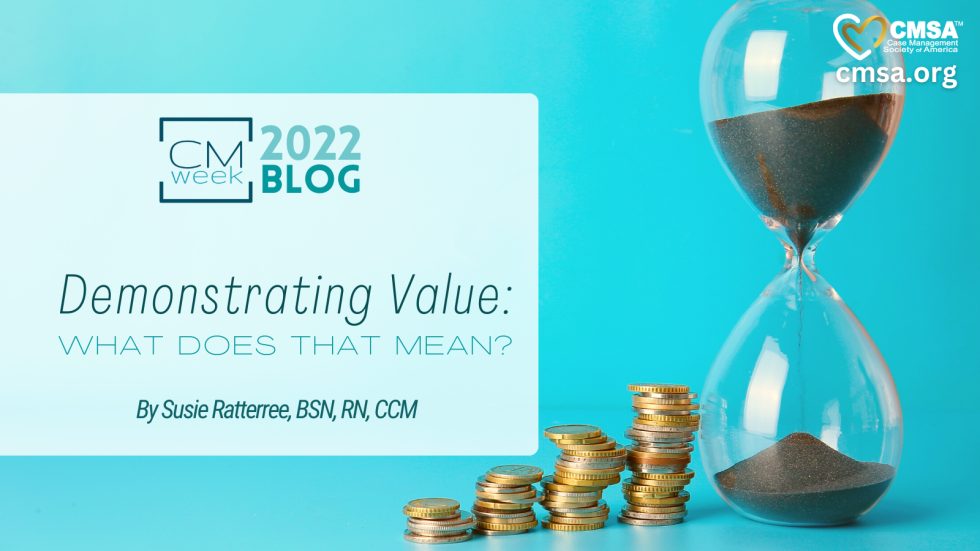By Susie Ratterree, BSN, RN, CCM
The case management industry faces many challenges, from the undefined value of case managers to a shortage of newly qualified case managers in the workforce. Respondents to the 2022 Salary & Trends Survey by CMSA and CMSI found that 58% of case managers are 51 years of age and older, 23% are 61 years of age or older and only 2% are under the age of 30. That means that 23% of case managers may be considering winding down their careers. The Covid-19 pandemic only added to the potential shortages as many healthcare workers including case managers left the industry due to “burnout.” Case managers are great advocates for our patients, but we do not advocate for ourselves well and do not encourage young healthcare graduates to consider a career in case management. If we can’t demonstrate the value of a career in case management to new and younger graduates, how are we going to be able to demonstrate our value to our employers?
In my most recent position, the financial department asked, “Why do we need case managers? They don’t generate revenue.” I’m sure many of you have heard that as well at some point in your career. As healthcare delivery systems move to value-based reimbursement models, it is imperative that case managers be able to demonstrate their value by the effectiveness of interventions, patient attainment of health goals and satisfaction with their healthcare experience and providers. Case managers are in the unique position of being able to identify issues and carry out new processes/initiatives that support evidence-based best practices. Utilizing evidence-based interventions further defines the value of case management practice by providing validity, reliability, and relevance to your patient population.
During the early days of the Covid-19 pandemic, the healthcare industry was overwhelmed by the sheer number of patients and a lack of information about the disease process and how to treat it. Hospitals were open only to patients and employees. Case managers were called upon to figure out how best to meet the needs of the patients, families, and transition patients back to the community. In some instances, they were asked to step back into a clinical role as well. Case managers are problem solvers and not only rose to the challenge, but their interventions also had a positive impact on patient and family satisfaction. Objective data was used to demonstrate the value of case management and provided validity, reliability and relevance and established best practices.
Case management departments need to have strategies and goals that prove their value based on performance initiatives that demonstrate improved outcomes as well as cost containment strategies. Case managers are the subject matter experts: ask for a seat at the table, use objective data that demonstrates the value of case management interventions, such as decreased readmission rates, increased patient satisfaction with their healthcare experience, attainment of goals and decreased inappropriate use of resources. Use that data to identify areas of improvement and develop evidence-based practice improvement processes to improve transitioning patients along the continuum and improve efficiency. Numbers can be your friend!
There are many ways case managers can demonstrate their value and become active in CMSA Public Policy initiatives is a great example of increasing awareness and influencing public policy concerning healthcare. Government plays a major role in population health. Laws and regulations influence how professional case managers can practice. For instance, practicing across state lines: Who can practice, and what education or credentials are required? Case managers are on the front lines and in the best position to influence public policy. They see daily the impact these policies have on patients and families. According to Morin & Baptiste, in the article “Nurses as Heroes, warriors and political activists in the JCN, August 2020), “It is time to revisit and reinforce a commitment to recognize the social determinants of health and support public health and social justice initiatives. It takes courage to be operational through political activism.”
The CMSA Foundation provides support for grant-funded projects quantifying case managers’ impact on healthcare outcomes including research studies, grants, scholarships, and recognition awards for projects that increase best practices and awareness in the case management industry. Let’s not be” the best keep secret in healthcare” (Skinner, N.). and shout our value for all the world to hear. I will close with the following quote from Amanda Gorman: “If only brave enough to see it, only brave enough to be it” (The Hill We Climb, 2021).
Bio: Susie is a graduate of the University of St. Mary, Leavenworth, KS, where she obtained a BSN and is currently licensed in Missouri and Kansas. Her professional background includes hospital, home health and hospice care as well as 20 + years of experience as a nurse case manager in a variety of settings, including workers’ compensation, managed care, group health, independent consultant, rehabilitation, and disability management. Susie earned her certification in case management in 1995 and continues to maintain this designation. Susie is active in the Case Management Society of America, serves on numerous committees locally and nationally, has held multiple offices on the executive board for her local chapter. She is currently serving as President of the CMSA Foundation. Susie is active in public policy activities and has participated in meeting and educating legislators about the value of Case Management, the Case Management Model Act and the Nurse License Compact Agreement.
To give back to the practice of case management this CM Week, go to www.cmsafoundation.org/cmweek2022. Don't miss the chance to win the SUPER BASKET worth over $1,000 with $500+ in gift cards!

